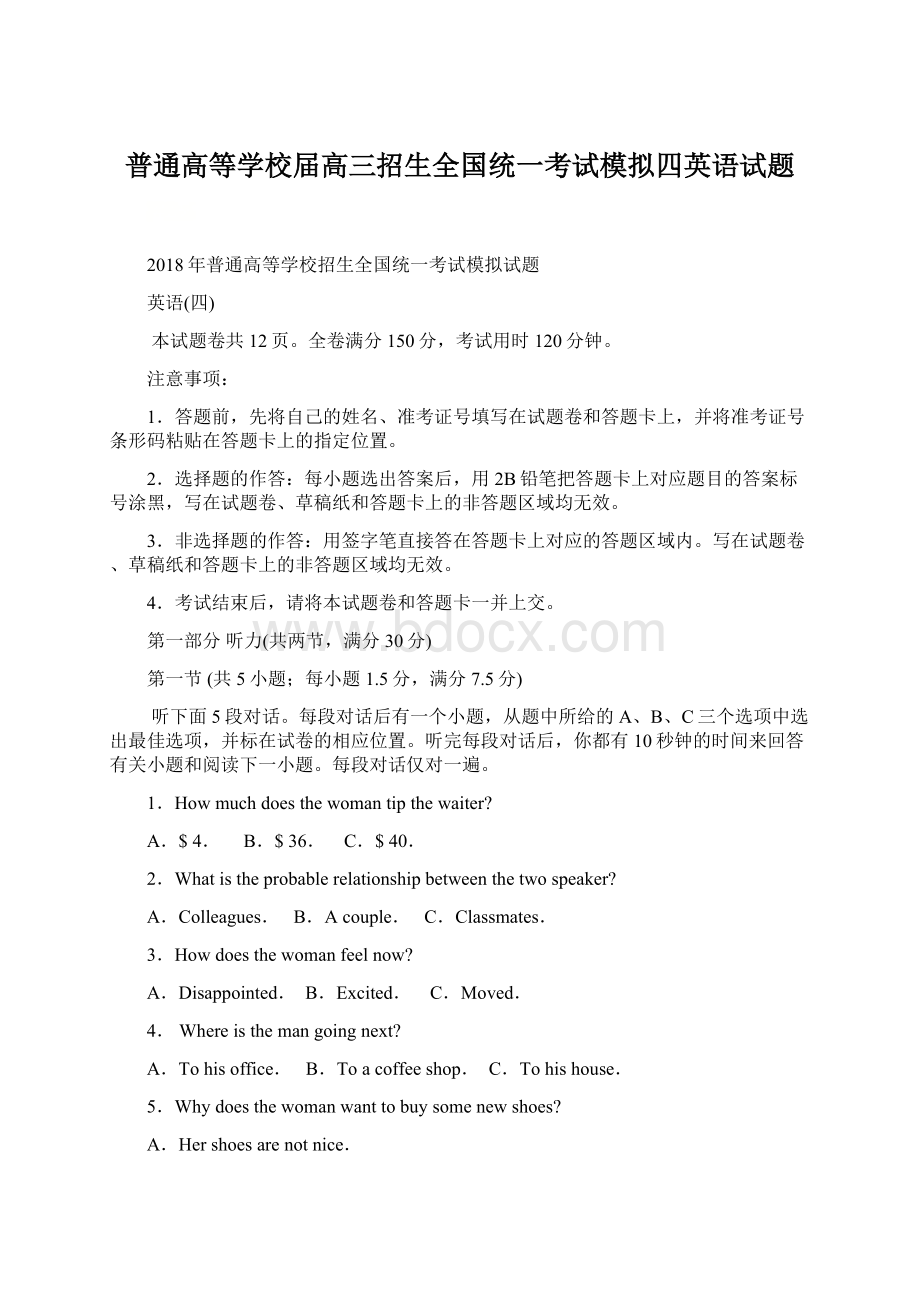普通高等学校届高三招生全国统一考试模拟四英语试题.docx
《普通高等学校届高三招生全国统一考试模拟四英语试题.docx》由会员分享,可在线阅读,更多相关《普通高等学校届高三招生全国统一考试模拟四英语试题.docx(15页珍藏版)》请在冰豆网上搜索。

普通高等学校届高三招生全国统一考试模拟四英语试题
2018年普通高等学校招生全国统一考试模拟试题
英语(四)
本试题卷共12页。
全卷满分150分,考试用时120分钟。
注意事项:
1.答题前,先将自己的姓名、准考证号填写在试题卷和答题卡上,并将准考证号条形码粘贴在答题卡上的指定位置。
2.选择题的作答:
每小题选出答案后,用2B铅笔把答题卡上对应题目的答案标号涂黑,写在试题卷、草稿纸和答题卡上的非答题区域均无效。
3.非选择题的作答:
用签字笔直接答在答题卡上对应的答题区域内。
写在试题卷、草稿纸和答题卡上的非答题区域均无效。
4.考试结束后,请将本试题卷和答题卡一并上交。
第一部分听力(共两节,满分30分)
第一节(共5小题;每小题1.5分,满分7.5分)
听下面5段对话。
每段对话后有一个小题,从题中所给的A、B、C三个选项中选出最佳选项,并标在试卷的相应位置。
听完每段对话后,你都有10秒钟的时间来回答有关小题和阅读下一小题。
每段对话仅对一遍。
1.Howmuchdoesthewomantipthewaiter?
A.$4.B.$36.C.$40.
2.Whatistheprobablerelationshipbetweenthetwospeaker?
A.Colleagues.B.Acouple.C.Classmates.
3.Howdoesthewomanfeelnow?
A.Disappointed.B.Excited.C.Moved.
4.Whereisthemangoingnext?
A.Tohisoffice.B.Toacoffeeshop.C.Tohishouse.
5.Whydoesthewomanwanttobuysomenewshoes?
A.Hershoesarenotnice.
B.Hershoesdon’tfither.
C.Hershoesareoldandtorn.
第二节(共15小题;每小题1.5分,满分22.5分)
听下面5段对话或独白。
每段对话或独白后有几个小题,从题中所给的A、B、C三个选项中选出最佳选项,并标在试卷的相应位置。
听每段对话或独白前,你将有时间阅读各个小题,每小题5秒钟;听完后,各小题将给出5秒钟的作答时间。
每段对话或独白读两遍。
听第6段材料,回答第6、7题。
6.Whatisthemangoingtodo?
A.Tofindanapartment.
B.Togohome.
C.Togotowork.
7.Whydoesthemanwanttoliveinthecity?
A.Hehasabusinessinthecity.
B.Hemanagesanightschoolthere.
C.Itisconvenienttoworkandstudy.
听第7段材料,回答第8、9题。
8.Wheredidthewomanstayfortheweekend?
A.Atherfriend’s.B.Atherparents’.C.Attheman’s.
9.Whatdidthewomandoatthebeach?
A.Shewentswimming.
B.Shedidsomejogging.
C.Shewentsurfing.
听第8段材料,回答第10至12题。
10.Whatisprobablythewoman?
A.Adoctor.
B.Asaleswoman.
C.Anassistant.
11.Whatiswrongwiththeman?
A.Hefeelsawfulafterthedinner.
B.Hehasapaininhischest.
C.Hewascutbyasharpknife.
12.Whenistheman’sappointmentscheduled?
A.At5:
30.B.At6:
00.C.At5:
00.
听第9段材料,回答第13至16题。
13.Whatdayisittoday?
A.Saturday.
B.Sunday.
C.Monday.
14.Whycan’tthewomanfocusonherreport?
A.BecausetheTVison.
B.Becauseit’stoodifficult.
C.Becausethemanisalwaystalking.
15.Whatdoesthemanadvisethewomantodo?
A.Studyinaquietplace.
B.Finishthereportquickly.
C.Watchtheshowwithhim.
16.Whenwillthewomanprobablyworkonherreport?
A.Tonight.
B.Tomorrowmorning.
C.Tomorrowafternoon.
听第10段材料,回答第17至20题。
17.Whichisamong“TheBigThree”sportsinAmerica?
A.Volleyball.B.Soccer.C.Baseball.
18.HowmanypeopleplaysoccerintheUS?
A.Over100million.
B.About25million.
C.About75million.
19.Whydomostparentswanttheirchildrentoplaysoccer?
A.Itiscompetitive.
B.Itiseasiertolearn.
C.Itisverysafe.
20.Whatisthespeakertalkingabout?
A.SoccerinAmerica.
B.Thebigthreeballs.
C.Soccerteams.
第二部分阅读理解(共两节,满分40分)
第一节(共15小题;每小题2分,满分30分)
阅读下面短文,从每题所给的A、B、C和D四个选项中,选出最佳选项。
A
MoreThanaNativeSpeaker
DonSnow
InthisnewlyupdatedThirdEdition.1earnstep-by-stephowtoeffectivelyteachEnglishinaforeigncountry.Gainvaluabletipsandresourcesforteachinginanunfamiliareducationalsystem,workingwithstudentsofvaryingagesandskilllevels,andadaptingtolifeinadifferentculture.
Was:
$54.95Now:
$43.95
SocialJusticeinEnglishLanguageTeaching
ChristopherHastings
ThisinspiringanddiversecollectionofvoicesfromthefieldinESLandEFLcontextspersonalizestheissuesTESOLeducatorsfaceandservesasaresourceforthosewantingtoaddresssocialinjusticesintheirindividualTESOLcontexts.
Was:
$60.95Now:
$39.99
BeyondRepeatAfterMe
MarlaTritchYoshida
Thisengagingtextclearlypresentsessentialconceptsthatteachersneedtoguidetheirstudentstowardclearlyintelligiblepronunciationandmoreeffectivecommunicationskills.Basedonasoundtheoreticalbackground,thebookpresentspractical,imaginativewaystoteachandpracticepronunciationthatgobeyondsimple“Repeatafterme”.
Was:
$47.95Now:
$38.76
WordlessBooks
GildaMartinez-Alba
Enableyourstudentstobesuccessful,regardlessoftheirliteracylevels.Wordlessbookshelptodeveloporallanguage,listening,vocabulary,andsomuchmore!
LessonideasinthisgroundbreakingbookarealignedwiththeCCSSforEnglishLanguageArtsandwiththeTESOLPre-K-12EnglishLanguageProficiencyStandards.Samplerubricsareincludedinthebookandonlineaseditabledocuments.
Was:
$35.95Now:
$22.95
21.WhichbookissuitableforthosewhointendtoteachEnglishabroad?
A.MoreThanaNativeSpeaker.
B.BeyondRepeatAfterMe.
C.SocialJusticeinEnglishLanguageTeaching.
D.WordlessBooks.
22.IfyoubuyoneWordlessBooks,howmuchcanyousave?
A.$11.B.$20.96.C.$9.19.D.$13.
23.Whoarethesebooksintendedfor?
A.Newspapereditors.
B.Englishlearners.
C.Languageteachers.
D.Educatedparents.
B
Booksallowusaglanceintothemindoftheauthors,butwhatifwecouldmakeadirectconnectioninstead?
Whatifwecouldaskspecificquestionsabouttheirexperiences,receiveinstantanswers,andheartheirstoriesfirst—hand?
Now,thankstoalibraryinDenmark,youcancheckoutapersonasyouuseabooktofindoutmoreabouttheiruniquestories.
AttheHumanLibrary,yougothroughsometitlesandpickoneyou’dliketoknowmoreabout.Whenyoudecideonatitle,youaretakentoadiscussionareatomeetyourhumanbookandhavethenext30minuteswithyour“book”tolearnaboutit.Thedownsideis,unlikeabook,thatyoudon’ttakethatpersonhomewithyou.Your“borrowed”humancouldbeanyone—afuneraldirector,politician,orevenachild—withanincrediblestorytotell.
TheHumanLibraryOrganizationcametobeinCopenhagen,Denmarkin2000.RonniAbergel,hisbrotherDany,andsomecolleagueshostedafour-dayeventduringamajorNorthernEuropeanfestival,hopingtoraiseawarenessaboutviolenceamongyouth.AftertheSuccess.AbergelfoundedtheHumanLibraryOrganization.Sincethen,ithasspreadtomorethan50countriesaroundtheworld.
Thoughthereareafewpermanenthumanlibraries,mostaren’tplacesatall,butevents.Evenifmanydotakeplaceatphysicallibraries,youdon’tneedalibrarycard—anyonecancomeandbepartoftheexperience.Allthat’sneededispeoplewhowanttotelltheirstories,andpeoplewhoarewillingtolisten.
24.Thewriterraisestwoquestionsinthefirstparagraphto__________.
A.stresstheimportanceofreading
B.drawthereaders’attentiontothetopic
C.pictureareadingsceneofthefuture
D.invitereaderstoanswerthem
25.WhichofthefollowingcouldbeadisadvantageoftheHumanLibrary?
A.Fewtopicsareavailablefordiscussion.
B.Thereislimitedtimeforcommunication.
C.Thehumanbookcan’tbetakenaway.
D.Noinstantanswerwillbereceived.
26.Tobecomeabookinhumanform,one______.
A.mustpresenthislibrarycard
B.hastobeatleast18yearsold
C.shouldgotothelibraryregularly
D.iswillingtosharehisstories
27.Accordingtotheauthor,theHumanLibrary_______.
A.hasspreadtoeverycornerofthewholeworld
B.isanactualplaceforreaderstodiscussaboutbooks
C.aimstoraiseawarenessaboutviolenceamongyouth
D.givesanewmeaningtothephrase“Iamanopenbook”
C
Weallhaveourownideaofwhattheperfectsmileshouldlooklike,whetherweshowamouthfulofwhitesorkeepourlipsclosedandturnedupatthecorners.Whenwethinkoftheperfectsmile,weoftenpicturesomeonegrinning,withallofourteethshowing,butbasedonnewfindings,lessisactuallymore.NathanielHe1wigandhiscolleaguesattheUniversityofMinnesotadiscoveredthatasuccessful,genuinesmileactuallyrestslessonshowingteethandmoreonfacialbalanceandsymmetry(对称).
Forthestudy,researcherslookedat3Dcomputer-animatedfacialmodelsofmorethan800studyparticipants.Thecomputer-animatedfacialmodelswentthroughaseriesoffacialtransformations,withresearcherschangingthemouthangle,amountofteethshown,thedegreeofthesmile.Participantswerethenaskedtoratethemodels’smilesbasedoneffectiveness,genuinenessandpleasantness.
Theresultsofthestudyfoundthatthemostsuccessfulsmilehadaperfectbalanceofteeth,anidealmouthangle,andasmilelengththatextendedtowhatwascanedthe“sweetspot”.Smilesthatshowedaquicksync(同步)oftheleftandrightsideofthefaceduringsmilingwerealsomorehighlyrelated.
Smilingmakesupagoodpartofournonverbal(非语言的)communication,makingitimportanttohaveagrinthatwilldrawpeopletoyouandalsoseemsincere.It’salsoworthnotingthatperfectsmilecouldhelpimproveyourhealthtoo.
28.Whatisthepossiblemeaningoftheunderlinedword“grinning”inthefirstparagraph?
A.Talkingsoftly.
B.Smilingwidely.
C.Chattingcheerfully.
D.Eatinghealthily.
29.Whichaspectshouldbeconsideredwhenratingthesmilesinthestudy?
A.Howpleasantitmakespeoplefeel.
B.Whetheritimproveshealth.
C.Howsuccessfulsmilingpeopleare.
D.Whetheritlastslongenough.
30.Whatmakestheperfectsmilebasedonthenewstudy?
A.Whiteteeth.
B.Smilelength.
C.Facialbalance.
D.Lipcorners.
31.Wheredoesthistextprobablycomefrom?
A.Abookreview.
B.Asciencereport.
C.Ahistorytextbook.
D.Atravellingguide.
D
Everyonewantstowin,andeverybodyknowsit.TakethecaseofOlympicathletes,whotrainhardeachdayforyearstoreachthetopoftheirsportandhopefullywinagoldmedal.Sinceeverycompetitor,sgoalistowin,weassumethatthesilvermedalistswouldbelesshappythangold-medalwinners,butstillhappierthanthoseinthirdplace.Commonsensesaysthatourlevelsofhappinessshouldhavesomethingtodowithourlevelsofachievement—exceptthatoftenthisisn’tthecase.
Researchersfoundthatbronzemedalistsactuallyappearedonthewholetobehappierthansilvermedalists.Howcouldthatbe?
Theanswer,inaword,isgratitude.Silvermedalists,whocomparedthem